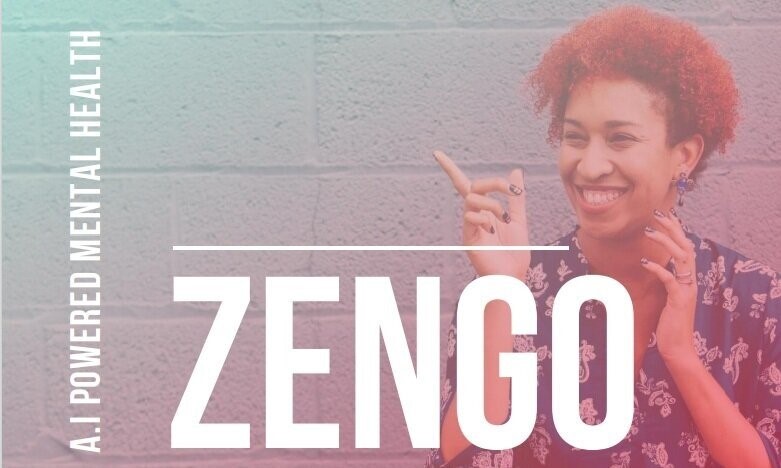Written By Change Gap in partnership with ZenGo
How would you describe the past year?
For us at Change Gap and ZenGo, some of the words that spring to mind are challenging, uncertain, unpredictable … just to name a few. The pandemic has posed many challenges and even though, here in the UK, we are beginning to get glimmer of ‘normality’ as the outside world is starting to open up, there is still a huge cloud of uncertainty hanging above us as we attempt to transition through to this next phase of ‘life’.
This unpredictability, alongside the long list of other ‘side effects’ from the pandemic are taking a real toll on mental health. It is unsurprising that the experience of depressive symptoms amongst UK adults has doubled since before the pandemic with a reported 1 in 4 adults now experiencing depressive symptoms in their everyday lives. Furthermore, people are feeling apprehensive about the future. In one study, over half (56%) of respondents stated that they think their future is going to be worse as a result of the pandemic. It is troubling to see the mental health gap widening, especially with the lack of readily available and affordable support needed to help people.
For Mental Health Awareness Week, we wanted to share our thoughts on mental health in the context of the pandemic, along with those of ZenGo, an A.I mental health platform for the workplace. ZenGo is a start-up we are supporting as part of our Corporate Social Responsibility as mental health in the workplace is a key pillar of our CSR and an area we are keen to contribute to closing the gap for ourselves and those around us in our workplaces.
We asked ZenGo’s psychologists for five pieces of advice for how to better manage the stress caused by these challenging times. With all the advice out there, we thought it would be helpful to share the science behind them. This article does not seek to provide or suggest there are quick fixes for improving serious mental illnesses as this is a highly complex subject and requires individual support from professionals. Instead, we aim to open up the conversation about mental health to reduce the stigma and share some pieces of advice that may help in these uncertain times.

Make a plan …
There will be several things we can’t control as we exit lockdown, which can lead to anxiety, but making a plan for the things we can control (and which we think will be difficult) can help us make things feel less vague and more manageable.
Take your time …
Do not feel pressured to jump back into the world if that makes you nervous. Where possible, pace yourself and build up a gradual level of tolerance to going into work or seeing groups of friends in indoor settings.
Focus on what you know …
There are still several different versions of what the ‘new normal’ might look like. Among all of the conflicting information, thinking about that can be unnerving and create further anxiety. Try to focus on the present and the things you do know for certain. Other things will materialise in time, and it’s ok to leave it at that.
These first three pieces of advice are regarded as effective ways to try to counter anxious rumination: repetitive thought patterns which become circular because they can’t be resolved. A tendency towards intense rumination has been linked with elevated cortisol levels and a range of mental health problems including anxiety and depression, PTSD, OCD and eating disorders (Yamakoshi and Tsuchiya, 2016; Moulds et al, 2016). Taking things one step at at time, concentrating on what can be known and using plans to structure thought processes are all well-established strategies to help manage rumination. You can find out more about this here.
Remember to be grateful for the good things …
Among all the uncertainty, there are many points of optimism. In the UK there is a glimmer of light at the end of the tunnel which brings some semblance of a return to normality. It’s important not to forget that.
Evidence for gratitude goes back to the early 2000s and research that (unpublished but referenced in Authentic Happiness by Martin Seligman) split a group into three cohorts and asked them to journal gratitude, negative experiences and neutral experiences found significant increases in happiness and life satisfaction amongst the gratitude participants after two weeks. Furthermore, a recent study even suggested gratitude could re-wire parts of the brain and also reinforced the association between gratitude and life satisfaction (Kong et al, 2020).
Get back into nature …
This year’s theme for mental health awareness week is nature. Getting into nature can help you become more rooted in, and aware of, your surroundings. Furthermore, it can provide a sense of familiarity, make you feel calm and lift your mood. Being in nature is also known to contribute to your physical wellbeing, reducing heart rate, blood pressure, muscle tension, and stress hormone production.

Some of the most compelling research surrounding the link between mental health and nature are tests which have suggested stress related physiological and psychological benefits from images and sounds of nature, improved affective, cognitive and physiological dimensions for study participants who walked in nature against others who walked in urban environments and an association of improved well-being in urban populations with proximity to green space (Ulrich et al, 1991; Berman et al, 2012; Aspinall et al, 2015; Dadvand et al, 2016; Roe et al, 2013).
Many people have found refuge in nature throughout the past year. One study found that 59% of respondents used walking outside to help cope with the stress of the pandemic and 42% found visiting green spaces helpful. If you are unable to get out in the fresh air, there are many ways to bring nature into your home for example by looking after a houseplant, growing your own herbs, using essential oils or even just hanging up pictures of nature.
We hope that you found something interesting or useful in this article but most of all we hope you feel less alone if you are experiencing any challenges during this time. This article signals the start of a journey for us as we look forward to creating more content on this and join others to help generate much needed change in this space. We would love for you to be a part of this journey so reach out to us if you have any thoughts or ideas on this. Alongside our core business mission to create a stronger financial services, better for all, our vision in this space is to work with others to ensure that ‘better for all’ includes the mental fitness of those working in and across the industry.

More about ZenGo …
ZenGo is an A.I mental health platform designed to help people better understand and manage mental health at work.
Mental health in the workplace has long been misunderstood and overlooked, and ZenGo’s goal is to provide people with the tools to help them track and improve their mental health over time, using personalised insights and recommendations to a curated range of clinically backed exercises.
If you want to know more about how ZenGo could help your team, please refer to their website: www.youzengo.com or contact them on: info@youzengo.com. Please also keep your eyes open for ZenGo’s updated website coming later this year.
References …
- Aspinall, P., Mavros, P., Coyne, R. and Roe, J., 2015. The urban brain: analysing outdoor physical activity with mobile EEG. British journal of sports medicine, 49(4), pp.272-276.
- Berman, M.G., Kross, E., Krpan, K.M., Askren, M.K., Burson, A., Deldin, P.J., Kaplan, S., Sherdell, L., Gotlib, I.H. and Jonides, J., 2012. Interacting with nature improves cognition and affect for individuals with depression. Journal of affective disorders, 140(3), pp.300-305.
- Dadvand, P., Bartoll, X., Basagaña, X., Dalmau-Bueno, A., Martinez, D., Ambros, A., Cirach, M., Triguero-Mas, M., Gascon, M., Borrell, C. and Nieuwenhuijsen, M.J., 2016. Green spaces and general health: roles of mental health status, social support, and physical activity. Environment international, 91, pp.161-167.
- Kong, F., Zhao, J., You, X. and Xiang, Y., 2020. Gratitude and the brain: Trait gratitude mediates the association between structural variations in the medial prefrontal cortex and life satisfaction. Emotion, 20(6), p.917.
- Moulds, M.L., Chung, K., Martin, A. and Samtani, S., 2016. Cognitive processes: The role of rumination in depression and transdiagnostically. Innovations and Future Directions in the Behavioural and Cognitive Therapies, p.127.
- Roe, J.J., Thompson, C.W., Aspinall, P.A., Brewer, M.J., Duff, E.I., Miller, D., Mitchell, R. and Clow, A., 2013. Green space and stress: evidence from cortisol measures in deprived urban communities. International journal of environmental research and public health, 10(9), pp.4086-4103.
- Ulrich, R.S., Simons, R.F., Losito, B.D., Fiorito, E., Miles, M.A. and Zelson, M., 1991. Stress recovery during exposure to natural and urban environments. Journal of environmental psychology, 11(3), pp.201-230.
- Yamakoshi, S. and Tsuchiya, H., 2016. The effects of trait rumination and reflection on mental health among Japanese university athletes. Psychology, 7(4), pp.533-540.

